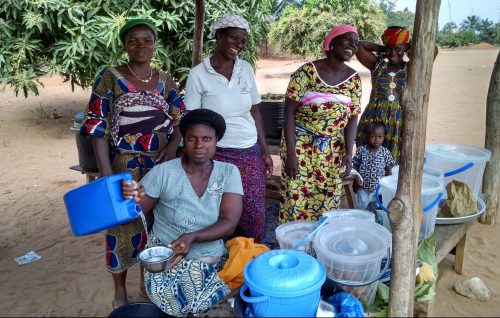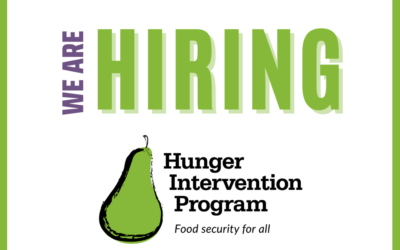Alex is HIP’s AmeriCorps VISTA Member this year who is responsible for coordinating HIP’s Summer Eats Program in addition to many other responsibilities. Before joining HIP, she was a Peace Corps Volunteer in Benin. In this piece, she reflects on how her experience in Benin shapes what she does today as part of HIP.
How are you? Is your family well? And your job? Have you eaten well?
If this salutation seems a bit strange to you, it’s because perhaps it is a bit strange. For me, however, it feels familiar. Having just come off a 27-month stint as a Peace Corps Volunteer in Benin, where this type of greeting is commonplace, I have come to realize that it is part of what makes human interaction so valuable. While it might seem invasive or overly personal to ask someone how well they’ve eaten or how their family is, it’s something that all of us share. After all, we all need sustenance, both physically and emotionally. And we all need to be able to talk about it.

The food vendors at my school, also called food “mamas.” They would get up before dawn to make sure students had food to eat between classes. Most of the time they would barely break even, but they never turned away a hungry child.
To be honest, I wasn’t going to talk about my time in Benin in this write-up. I recognize that there are many mixed feelings about foreign service and that it’s impossible to condense a decontexualized 2.25-year-long experience into a few paragraphs. But then I thought, you know what, yes. This is an experience that has shaped me and brought me to where I am today: here at HIP, trying to make sure that no one goes hungry and that all people are food secure. So please allow me this tiny tirade.
I am lucky to have always been food secure. Very few times in my life have I had to wonder where my next meal was coming from, and for that I am grateful. But I also recognize that for many people in the world, this is not the case. In Benin, I saw firsthand how food insecurity can affect people’s livelihoods. I taught in a secondary school in a very small, rural village, where many of the students did not have enough to eat. A majority of these students even had to work in the fields with their families between classes. Obviously, these were the students who performed poorly in school. While they could have been at the top of their class and fully immersed in the material, they were instead left floundering and unable to participate. I began to recognize the signs of food insecurity: fatigue, dizziness, inability to concentrate, and general disengagement.
Coming back to the States, I’ve found myself recognizing these signs in the people around me. How many are affected by this same plague of hunger? And what steps can be taken to combat it? The root causes of food insecurity are complicated and heavily intertwined, which is why I’m happy to be able to work for an organization that recognizes these complexities. As Summer Eats Program Coordinator, it is extremely rewarding to be able to provide children and their families with the basic necessities that they need to have full and prosperous lives. It’s jolting to recognize that these rights are being withheld from so many people in one of the richest countries in the world – especially when I was brought up to believe that all human life is valuable and that everyone should have the same rights. Hunger is not just an “over there” problem. It is local, it is pervasive, and it is all of our responsibility.
So I ask you again: How are you? Is your family well? And your job? Have you eaten well?
These are important questions to ask, whether or not they feel natural. It is important to check in with one another and then ask ourselves: Can we do better?

All the best,
Alex Peterson
AmeriCorps VISTA




This article exposes a ‘fragile underbelly’ of our society about which many are unaware or do not ‘want’ to be aware. Kudos to the author for helping to bring it to light in this article. It is heartwarming to know that empathetic and determined individuals like the author and organizations like HIP exist. As Mahatma Ghandi said: “A nation’s greatness is measured by how it treats its weakest members.”